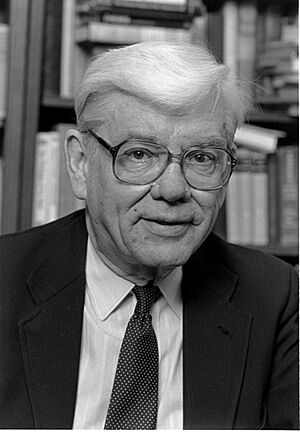Jaroslav Pelikan facts for kids
Quick facts for kids
Jaroslav Pelikan
|
|
|---|---|
 |
|
| Born |
Jaroslav Jan Pelikan
December 17, 1923 Akron, Ohio, US
|
| Died | May 13, 2006 (aged 82) Hamden, Connecticut, US
|
| Education |
|
|
Notable work
|
The Christian Tradition (1971–1989) |
| Spouse(s) |
Sylvia Burica
(m. 1946) |
| Scientific career | |
| Institutions | |
| Thesis | Luther and the Confessio Bohemica of 1535 (1946) |
| Doctoral advisor | Wilhelm Pauck |
| Doctoral students |
|
| Other notable students | Mark McIntosh |
| Influenced | Philip Hefner |
| Signature | |
Jaroslav Jan Pelikan Jr. (born December 17, 1923 – died May 13, 2006) was an American expert who studied the history of Christianity, Christian beliefs, and medieval ideas at Yale University. He was known for his many books and his deep understanding of how Christian thought developed over time.
Contents
Early Life and Learning
Jaroslav Jan Pelikan Jr. was born on December 17, 1923, in Akron, Ohio. His parents, Jaroslav Jan Pelikan Sr. and Anna Buzekova Pelikan, were from Slovak families. His father and grandfather were both Lutheran pastors. This meant that religion and learning were very important in his family.
Even when he was very young, Jaroslav loved to write. His mother taught him to use a typewriter at age three because he wanted to write but couldn't hold a pen well yet. He was also very good with languages, which helped him a lot in his career. He studied not only Roman Catholic and Protestant history but also the history of Christianity in the East.
In 1946, when he was 22, he earned two degrees. He got a seminary degree from Concordia Seminary in St. Louis, Missouri and a PhD from the University of Chicago.
Important Writings and Ideas
Pelikan wrote more than 30 books. His most famous work is a five-volume series called The Christian Tradition: A History of the Development of Doctrine (1971–1989). This huge work explored how Christian beliefs changed and grew over many centuries.
Some of his other popular books include Mary Through the Centuries, Jesus Through the Centuries, and Whose Bible Is It?. These books helped people outside of academic circles understand complex religious topics.
In 1983, Pelikan gave a famous speech called the Jefferson Lecture. In it, he shared a quote that many people still remember:
Tradition is the living faith of the dead; traditionalism is the dead faith of the living.
He explained that true tradition means learning from the past while still thinking for yourself in the present. Traditionalism, on the other hand, means doing things only because they were done before, without new thought.
Professor at Yale University
Pelikan started teaching at Yale University in 1962. He became a very respected professor, holding the title of Sterling Professor of History from 1972 until he retired in 1996. He also led the Graduate School at Yale for a few years.
He received many awards for his work, including the Wilbur Cross Medal and the Haskins Medal. Pelikan was also chosen for many important leadership roles in American intellectual life. He was the president of the American Academy of Arts and Sciences and a member of the American Philosophical Society. He also helped edit the religion section of the Encyclopædia Britannica and started the Council of Scholars at the Library of Congress.
In 1983, the National Endowment for the Humanities chose him to give the Jefferson Lecture. This is a very high honor given by the U.S. government for great achievements in the humanities. His lecture later became his book The Vindication of Tradition.
President Bill Clinton also asked Pelikan to serve on the President's Committee on the Arts and Humanities. Pelikan received honorary degrees from 42 universities around the world.
In 2004, Pelikan received the John W. Kluge Prize for Lifetime Achievement in the Human Sciences. He shared this award with French philosopher Paul Ricoeur. Pelikan gave his $500,000 prize money to Saint Vladimir's Orthodox Theological Seminary, where he was a trustee. He often quoted a line from the writer Johann Wolfgang von Goethe: "Was du ererbt von deinen Vaetern hast, Erwirb es um es zu besitzen" ("Take what you have inherited from your fathers and work to make it your own."). This quote meant a lot to him.
From Lutheran to Orthodox Faith
For most of his life, Pelikan was a Lutheran pastor. He was part of the Lutheran Church–Missouri Synod and later the Evangelical Lutheran Church in America.
However, in 1998, he and his wife Sylvia joined the Orthodox Church in America. This happened after he met Pope John Paul II. His family said that Pelikan felt he wasn't really "converting" to Orthodoxy but rather "returning to it." He felt like he was peeling back layers of his own beliefs to find the Orthodox faith that was always there.
Even after changing his church, Pelikan continued to work for unity among different Christian churches. He believed that all churches should work together to become one, as their Lord wished.
Later Years and Passing
Jaroslav Pelikan passed away on May 13, 2006, at his home in Hamden, Connecticut. He was 82 years old and had been battling lung cancer for 17 months. He was buried in Grove Street Cemetery in New Haven, Connecticut. A special memorial service was held at Yale University to honor his life and work.
Images for kids
See also
 In Spanish: Jaroslav Pelikan para niños
In Spanish: Jaroslav Pelikan para niños
 | Jewel Prestage |
 | Ella Baker |
 | Fannie Lou Hamer |


